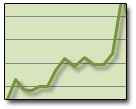 I don’t pretend to understand all the workings of macroeconomics, though I’ve made efforts in recent years to educate myself on larger-scale economics issues that would’ve bored me senseless when I was younger — and far more intrigued by Beavis and Butthead than by short-term interest rates and credit spreads.
I don’t pretend to understand all the workings of macroeconomics, though I’ve made efforts in recent years to educate myself on larger-scale economics issues that would’ve bored me senseless when I was younger — and far more intrigued by Beavis and Butthead than by short-term interest rates and credit spreads.
When I read the following Reuters article the other day, I found myself agreeing with the author far more than I’ve done with most mainstream financial writing lately:
Reuters: Fed is Banking on Phony Wealth Effect
I suppose it would be nice to believe, as so many money gurus do, that our Federal Reserve officials and economists at large have so much knowledge and historical data these days that it’s virtually impossible for our economy (or the world’s economy, for that matter) to undergo any sort of “great depression” as was experienced in the 1930s. There are, as I’ve heard Dave Ramsey say on more than one occasion, “too many safety valves in place.”
Ummm … yeah.
I don’t buy that theory for a second. Rather, I tend to believe that usually, that kind of pride and arrogance (“The Titanic is unsinkable!”) goes before the fall. Nature, and other forces larger than us, have a way of eventually cracking whatever multi-reinforced structures we previously believed were failproof.
Sometimes it’s ocean liners. Sometimes it’s Centralized Economic Recovery Planning™.
Equilibrium, in short, will always have its day.
From the article:
A round of speeches from key Fed officials has given the clear view that, faced with deteriorating conditions and trapped by the lower bound of zero in its monetary policy, the Fed is preparing to once again buy up large amounts of Treasuries, perhaps even more than the government is issuing on an ongoing basis, in an attempt to drive down market interest rates and stimulate the economy.
Will that do any good, given that people generally do not want to borrow and the banking system is impaired?
“Balance sheet policy can still lower longer-term borrowing costs for many households and businesses, and it adds to household wealth by keeping asset prices higher than they otherwise would be,” Sack said in a speech in Newport Beach, California on Monday.
And right there is where we step into folly: Keeping interest rates artificially low means asset prices will stay higher than they otherwise would be. And apparently, for our Fed captains, this brings additional household “wealth.” Which of course exists only to be borrowed against, and spent.
So, there you have it: Pump up asset prices and hope that people spend some of the ephemeral gains. The idea that people will spend more if their houses and other assets rise in value is called the wealth effect, but this policy creates only pretend wealth.
In fact, many people in the U.S. now face diminished retirements and generally straitened circumstances precisely because they mistook the rising prices of their house and Internet stocks for wealth and spent or borrowed against it. Is the U.S. actually so desperate for economic activity that this is the best it can do? Apparently so.
Yes. I think some would call it “empire in decline,” actually. When the answer to every question is “more borrowing” and “more debt,” you really have to step back and admire all the delusion around you. This can’t end well.
I’m pretty certain that equilibrium will have its day. I don’t imagine that it will be pretty, either.
The only question is how long we can put it off.

